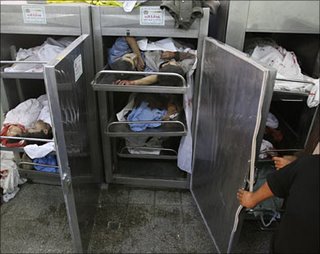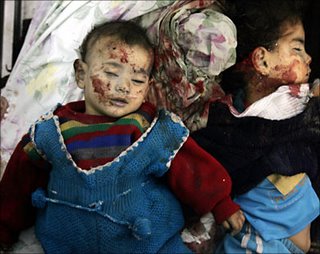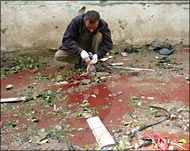Human errors, or, The human stain on war technology



It is not a novelty, nor is it an exaggerated use of power. It is simply another incident that, for journalistic reasons, has occupied a privileged place in the news agenda.
Perhaps few have noticed that
Like all the massacres that are big enough to impose a justification from the Israeli army spokesmen, Beit Hanoun’s massacre had the privilege of getting a story, and a reason. Those who died, rather those who didn’t will have some form – even if questionable – of explanation for why those who died did.
The soldier was sitting in his post on a hill. He could see
Modernity, in its technological form, has given humanity the gift of accurate weapons, the wonders of smart bombs and high tech weaponry. That is of weapons which are, if free from human interference, able to kill mercifully, justly, and inevitably. Unfortunately the human factor is an inconvenience for these machineries of justice – or at least this what one has to understand from the Israeli discourse of justification, and the same goes for the American one. Sometimes, like this time, or many times before, a soldier can miss the target. This is called human error, and it justifies the crime, since after all it was an error.
A guy was sitting silently in the shadow of the nightly sky. A gun extended from his hand gave him the attributes of a lurking killer. The stars were shy and the moon never goes out alone; it was dark. A shadow appears, indistinguishable; the man cocks his gun and aims at the moving form. The gun fires, and a mass of human flesh drops. The man goes nearer to his victim. Under the soft light coming from the nearby window he sees a stranger, dead and soaked in a reddish liquid. The dead body is not who he expected it to be; he mistook his victim for another one. A human mistake where the weapon is innocent; and the killer’s only guilt is that of misaiming. The question that poses itself is simple: is this man a criminal or not?
To kill people in a war is apparently normality; it is after all a war. In the old ages one of the strategies of war, was fear. To scare the enemy by demonstrating the immense violence that can befall on him; spectacular violence it could be called.
One of the strategies of the Israeli army, until proven otherwise by something else than the recurrent human error justification, is random killing. Or perhaps I could even go so far as to say deliberate killing of women and children.
Today’s score is relatively limited: 18 killed and approximately 45 injured. Needless to say the killed are mostly children and their mothers.

0 Comments:
Enregistrer un commentaire
<< Home